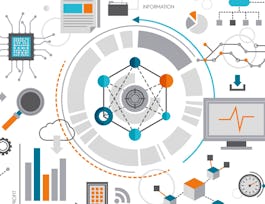Data visualization is a critical skill for anyone that routinely using quantitative data in his or her work - which is to say that data visualization is a tool that almost every worker needs today. One of the critical tools for data visualization today is the R statistical programming language. Especially in conjunction with the tidyverse software packages, R has become an extremely powerful and flexible platform for making figures, tables, and reproducible reports. However, R can be intimidating for first time users, and there are so many resources online that it can be difficult to sort through without guidance.



Getting Started with Data Visualization in R
This course is part of Data Visualization & Dashboarding with R Specialization

Instructor: Collin Paschall
Sponsored by Coursera Learning Team
30,268 already enrolled
(275 reviews)
Skills you'll gain
Details to know

Add to your LinkedIn profile
9 assignments
See how employees at top companies are mastering in-demand skills

Build your subject-matter expertise
- Learn new concepts from industry experts
- Gain a foundational understanding of a subject or tool
- Develop job-relevant skills with hands-on projects
- Earn a shareable career certificate


Earn a career certificate
Add this credential to your LinkedIn profile, resume, or CV
Share it on social media and in your performance review

There are 3 modules in this course
In this module, we will get set up with R to process data for visualizations. You should begin by watching the introductory videos in each lesson. Then, carefully review the readings and reference materials provided. Once you have done that, I recommend watching the videos again to check your understanding. You will take a few quizzes as you progress through the material to make sure you are keeping up.
What's included
8 videos7 readings4 assignments1 peer review
In this module, we will use functions from the tidyverse to manipulate data. You should begin by watching the introductory videos in each lesson. Then, carefully review the readings and reference materials provided. Once you have done that, I recommend watching the videos again to check your understanding. You will take a few quizzes as you progress through the material to make sure you are keeping up.
What's included
5 videos7 readings2 assignments1 peer review
In this module, we learn to make reproducible reports using R Markdown. You should begin by watching the introductory videos in each lesson. Then, carefully review the readings and reference materials provided. Once you have done that, I recommend watching the videos again to check your understanding. You will take a few quizzes as you progress through the material to make sure you are keeping up. Then, at the end of the module, you will submit an assignment for peer review that covers all of the material in this course.
What's included
3 videos8 readings3 assignments1 peer review
Instructor

Offered by
Why people choose Coursera for their career




Learner reviews
275 reviews
- 5 stars
83.27%
- 4 stars
12.36%
- 3 stars
2.18%
- 2 stars
0.36%
- 1 star
1.81%
Showing 3 of 275
Reviewed on Jun 8, 2021
I very much appreciate Colin's style and pace. This course is really well done and I would recommend highly !
Reviewed on Sep 26, 2021
An accessible introduction to the world of R and Ggplot. The Specialization is recommended for researchers of all areas.
Reviewed on Dec 29, 2020
Great for learning data wrangling and visualization
Recommended if you're interested in Data Science

University of Michigan

Johns Hopkins University

Open new doors with Coursera Plus
Unlimited access to 10,000+ world-class courses, hands-on projects, and job-ready certificate programs - all included in your subscription
Advance your career with an online degree
Earn a degree from world-class universities - 100% online
Join over 3,400 global companies that choose Coursera for Business
Upskill your employees to excel in the digital economy




